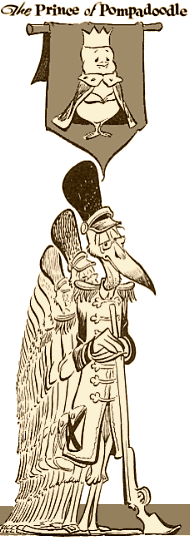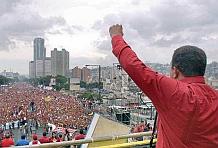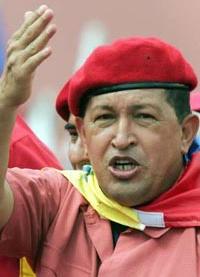 The Prince of Pompadoodle
The Prince of PompadoodleLived behind a castle wall,
Behind a moat, behind a guard
Of twenty soldiers tall.
The Prince of Pompadoodle
Was the safest man alive.
Each day he wrote how long he’d lived
And multiplied by five.
The Prince of Pompadoodle
Would survive, he did decide,
Five times as long as he had been
Alive before he died.
— Walt Kelly, from Pogo’s Sunday Punch
Like most dictators who ascend the pinnacle of power, Venezuelan President Hugo Chávez is looking to extend his time at the top indefinitely. And why not? Of what use are the privileges and perquisites of power if they cannot be used to maintain oneself in power?
After all, in its own modest way, the United States Congress acts with the same purpose in mind. Liberal use of the franking privilege, “campaign finance reform”, free air time on TV, media-generated name recognition — these all but insure that a congressman gets to keep “The Hon.” in front of his name indefinitely, continuing to serve the commonweal without worrying overmuch that the public will ever vote him out of office.
And so it is with the Latin American caudillo. After the scramble to the top, and the consolidation of power, the next order of business is to rig the game so that El Presidente gets to keep his palace and his epaulets for the rest of his natural life, or until the next military coup, whichever comes first.
Hugo Chávez has now consolidated his power to the point where he is confident in his ability to change the Venezuelan constitution:
Venezuelan President Hugo Chávez said the country’s constitution needs to be changed to “deepen the revolution” and gave no details as to possible amendments.
[…]
Chávez rewrote Venezuela’s constitution after he was elected president in 1998. Voters overwhelmingly approved the new constitution, which included a name change for the country and reorganized the Venezuelan Congress, in December 1999.
The former military officer has previously threatened to rewrite the constitution to allow him to serve through 2031 if the country’s opposition parties boycott elections scheduled for December.
Chávez obviously hopes to maintain his current position into his dotage and beyond. After all, when you control the media and the public purse, and can mobilize goon squads against any organized opposition, changing your country’s constitution is but a small matter.
If the United States is the Great Bully of the Western Hemisphere, Chávez is setting himself up as the Little Bully. All those millions of barrels of oil make it easy for Mr. Red Beret to punch above his weight. He struts and frets his way across the Latin American stage, horning in on an election here and there, being pals with Fidel, blustering and threatening the Yanqui imperialists, offering F-16s to the Iranians while hinting that he might take a little “peaceful” nuclear technology in exchange, and generally acting out the stereotype of a tinpot South American dictator.
 He’s a big cheese in South-of-the-Border Land, and Latin America admires him and looks to him for leadership… or so he thinks. After all, Jimmy Carter himself has given Hugo his imprimatur, so he must have arrived, right?
He’s a big cheese in South-of-the-Border Land, and Latin America admires him and looks to him for leadership… or so he thinks. After all, Jimmy Carter himself has given Hugo his imprimatur, so he must have arrived, right?Chávez can be forgiven for thinking so, because he, like Osama bin Laden and Mahmoud Ahmadinejad, moves and speaks within the echo-chamber of the international media. Presumably he has flunkies monitoring CNN and the wire services and the New York Times, and he hears the buzz that his bluster and bravado produce in the legacy media. Why wouldn’t he count himself among the movers and shakers?
But it turns out that his interference in the internal affairs of other Latin American nations is not having the intended effect. According to The Washington Times, having Hugo Chávez on your side is not necessarily the best strategy, assuming that you want to win an election:
Ideological allies of Mr. Chávez’s who had been expected to win the presidencies in Mexico and Peru have plummeted in polls, as voters take offense at the Venezuelan leader’s public campaigning as an insult to their respective nations’ independence and sovereignty.
Moreover, the backlash is threatening to spread to other nations, including Venezuela, and Mr. Chávez’s checkbook diplomacy is adding to suspicions of a man who fashions himself as a 21st-century version of South America’s liberator, Simón Bolívar.
[…]
In recent weeks, Mr. Chávez’s spending and his use of the bully pulpit to back leftist political candidates in other Latin American nations has caused diplomatic spats with Nicaragua, Peru and Mexico, all of whom accuse the Venezuelan of meddling in their affairs.
On May 4, Nicaraguan Foreign Minister Norman Caldera asked Mr. Chávez to end his interfering in Nicaragua’s election after Caracas agreed to provide 10 million barrels of oil annually to 51 Nicaraguan communities whose leftist mayors are sympathetic to presidential candidate Daniel Ortega.
Mr. Ortega, a former president and a Chávez favorite, fought a war against U.S.-backed Contra rebels in the 1980s before being voted out of office.
Even Mr. Ortega is said to fear that Mr. Chávez’s public support for his candidacy threatens to derail his comeback.
Similarly in Peru, Mr. Chávez caught heat for publicly backing leftist presidential hopeful Ollanta Humala. Mr. Humala, a former colonel who fits the Latin American mold of populist strongman, is considered key to Mr. Chávez’s plan to link the resource-rich Andean nations as a buffer against Colombia, Washington’s key ally in the region.
Peru withdrew its ambassador to Caracas earlier this month to protest Mr. Chávez’s campaigning in its election. But what may be more significant, Mr. Humala, once a clear front-runner, is scrambling to distance himself from Mr. Chávez as his lead evaporates in an upcoming election against former President Alan Garcia.
In Mexico, campaign ads branding left-wing candidate Andres Manuel Lopez Obrador as a puppet of Mr. Chávez’s have helped erase what was once considered an insurmountable lead for Mr. Lopez Obrador in upcoming presidential elections.
So instead of the new Simón Bolívar, Chávez looks more like the Latin American Howard Dean, the kiss of death for any aspiring politician.
The Times Online has something similar to report:
The revolutionary dreams of Hugo Chávez, president of Venezuela, are facing a setback in two Latin American elections where voters are poised to reject the candidates who have embraced the anti-American nationalism espoused by the strongman of Caracas.
President Alvaro Uribe of Colombia is coasting to re-election today despite criticism by Chávez of his co-operation with the United States in fighting drug trafficking and paramilitary groups.
In Peru, Chávez’s outspoken support for Ollanta Humala, an ultra-nationalist former army officer, appears to have backfired. Humala’s moderate leftist opponent Alan Garcia, the former president, has capitalised on irritation with Chávez’s “interference” to move 12 points ahead in the latest opinion poll before next Sunday’s presidential vote.
The polls in both countries are being seen in Washington as reassuring evidence that Chávez’s plans for a so-called “Bolivarian” revolution — named after Simón Bolívar, the Latin American scourge of colonialism — are unlikely to expand beyond his alliances with Cuba and Bolivia.
Colombian voters have shown little interest in leftists who admire Chávez’s populist policies and Uribe is expected to win more than 50% of the vote, avoiding a second round run-off.
In Peru, Garcia has made no secret of his disdain for Chávez, whom he has accused of “petro-imperialism” — using Venezuela’s oil wealth to wield undue influence over poorer countries.
And, according to NDTV:
In the past weeks, [Peruvian President] Alejandro Toledo has repeatedly asked Chávez not to interfere in Peru’s internal affairs.
Toledo had pulled Peru’s ambassador from Caracas at the beginning of May in protest over Chávez’s first comments publicly endorsing Humala.
Chávez announced a few days later that he was withdrawing his ambassador from Peru, insisting that insults by Garcia were to blame.
The Venezuelan strongman doesn’t seem to be getting much bang for his megabucks. What’s going on here?
 Recently Lee Harris, in “Why Isn’t Socialism Dead?”, portrayed Chávez as the leader of a socialist revival. Together with Fidel and Bolivia’s Morales, the three socialist strongmen would raise the banner of Socialism in Latin America, giving a new lease on life to a movement that had been declared brain-dead. The idea is that Socialism is backed by a powerful myth, and Capitalism is not. The fact that Socialism has never worked, and can’t work, is irrelevant: the demagogic appeal of the myth transcends mere practicality. Drawing on the energy of class envy, and promising an easy fix, the Socialist corpse, according to Harris, was rising from the dead.
Recently Lee Harris, in “Why Isn’t Socialism Dead?”, portrayed Chávez as the leader of a socialist revival. Together with Fidel and Bolivia’s Morales, the three socialist strongmen would raise the banner of Socialism in Latin America, giving a new lease on life to a movement that had been declared brain-dead. The idea is that Socialism is backed by a powerful myth, and Capitalism is not. The fact that Socialism has never worked, and can’t work, is irrelevant: the demagogic appeal of the myth transcends mere practicality. Drawing on the energy of class envy, and promising an easy fix, the Socialist corpse, according to Harris, was rising from the dead.So why isn’t it working? Why is Hugo Chávez proving to be the anti-Midas to everything he touches outside of Venezuela’s borders?
Perhaps the answer lies in nationalism. Latin American countries all seem similar to us ignorant gringos, but they certainly recognize differences among themselves. Ask a Peruvian what he thinks of Ecuador, and you’re likely to get an earful, not all of it polite.
We Virginians hate to be told what to do by New Yorkers, let alone Canadians. I have to think that’s what it’s like for a Mexican listening to Chávez endorse a candidate in a Mexican election.
“Who does the think he is, telling us what to do? After all he’s only a Venezuelan!”
 Hugo Chávez, like Osama bin Laden, Kim Jong-Il, Mahmoud Ahmadinejad, and Fidel Castro, has set himself as the Not-America guy, the one who stands up to El Norte and the Yankee dollar. As such, absent the nuclear weapons he evidently covets, he is no more than an ankle-biting annoyance.
Hugo Chávez, like Osama bin Laden, Kim Jong-Il, Mahmoud Ahmadinejad, and Fidel Castro, has set himself as the Not-America guy, the one who stands up to El Norte and the Yankee dollar. As such, absent the nuclear weapons he evidently covets, he is no more than an ankle-biting annoyance. The oil threat is just so much bluster. After all, oil is fungible — as long as he sells it, the United States is buying, no matter who the initial customer is or where the crude was pumped. And without oil he is nothing, a banana republic dictator without his bananas.
This is not to say that the Prince of Pompadoodle doesn’t bear watching. But let’s not over-inflate his stature; after all, that’s just what he’d like us to do.

Hat tip: Wally Ballou.

7 comments:
That's right, and he's doing his best to squander the bonanza he got as quickly as possible. His mismanagement of oil production (although actual figures are secret) has apaprently caused Venezuelan oil dproduction to plummet, though this effect has been masked by high prices (Link)
Ecuador and Bolivia will likewise learn soon that the true cost of nationalization is to trade foreign "exploitation" for domestic corruption and declining productivity.
Blaming everything on the yanqui can take you a long way in Latin America, but sooner or later even the adoring Venezuelan poor may notice that they are getting very little bang for their bucks, and they will resent their caudillo using "their" oil wealth as his personal piggy bank to fund his foreign schemes. Many of the Latin American elites, even on the left, are already wary of this screwball, because they know he isn't leading them anywhere they want to go.
One of his schemes, that he seems to have put on the back burner for now, involved an explicitly racist movement of South American indigenes and negroes against "whites" - hardly Bolivarian, that. He plays the race card in Venezuela masterfully, and all the usual idiots in the West (e.g. the BBC) swoon and call his opposition "racist elites", but when he calls for a continent-wide race war, he may be making a lot of his neighbors uneasy.
One way or another, this guy is going to walk into a buzzsaw one of these days. We don't need Pat Robertson to bump him off.
Socialism has never worked, and can’t work, is irrelevant: the demagogic appeal of the myth transcends mere practicality.
I wrote about this a little while back (Domesticating the Global Left). In my view populism/economic nationalism tends to flourish when a country is unable to exploit its natural resources, and must instead rely on the foreigner, who demands compensation for the risk and expense and thus generates irritation. Countries that have lots of resources and little human capital in this theory tend to be those who are most prone to Chavez-style insurrections.
The good news is that the weaving of some countries into the global economy increases their respect for property rights. Among the nations most angry about Bolivia's nationalization is Brazil, whose state gas company lost the most property.
Good article Baron. I appreciate the irony in the Bolivian situation where the nationalized gas companies were Brazilian and Spanish. It was entertaining to see Brazilian president Lula Da Silva trying to read the riot act to Evo Morales over this seizure.
I can’t wait until a new edition of Guide to The Perfect Latin American Idiot is published – Hugo Chavez is sure to be prominently featured.
And Jimmuh Carter's place in history is assured - even as his latest literary dropping - by all accounts a typically self-serving, sanctimonious and meretricious bit of trash - whoops it up about our "endangered" values, he will never be forgotten as the American President who never met an anti-American dictator whose nether regions he didn't want to smooch.
The bastard has just helped himself to Ecuador's Oxy booty here. This comes right on the heels of his 'Hitler In Paris' tour of his new properties in Bolivia. With a hat tip to Mark Steyn, call it a bus-and-truck version of the blitzkreig.
Meanwhile, over in OPEC, he seems desperate to set a price 'floor' of fifty dollars a barrel for oil. He has revealed his hand in how high he needs oil prices to cling to power. Let's do our damndest to get oil below fifty bucks a barrel. We can then watch him deflate like a popped balloon.
Fluffy -- I read that story when it first came out, although the full version in FT was subscribers-only.
LGF had a link to a Rigzone version of the story; I think this is it: Venezuela Buys Oil to Meet Contracts.
Nobody really seems to know for certain what's going on.
You are certainly right about not overinflating "President" Chavez's importance, but he shouldn't be underrated either. If the world really is starting a populist turn as some folks seem to think, he could turn out to be pretty dangerous: a Castro with cash, with the ability to be a serious irritant when we are tied down elsewhere.
Our own chattering classes are very infatuated with him, as your photo of Chavez and the Peanut Man shows.
On vacation, so time and computer access preclude more substantive comment, but glad somebody is paying attention.
Post a Comment